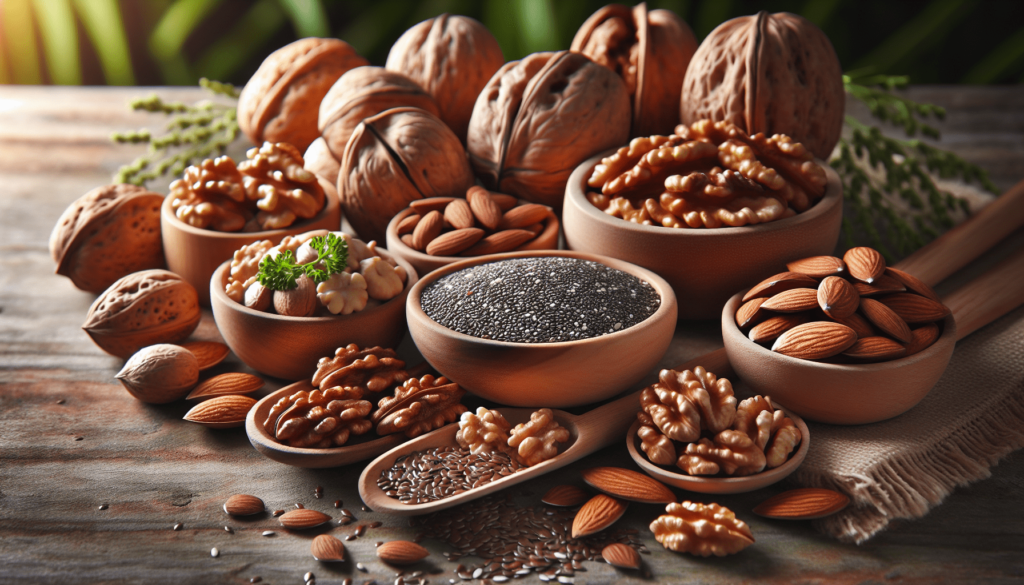Welcome to an enlightening journey exploring how nuts and seeds play a crucial role in the production of short-chain fatty acids in your gut. By consuming these nutrient-dense foods, you are not only satisfying your taste buds but also nourishing your gut microbiota, leading to a healthier digestive system. Let’s dive into the science behind how nuts and seeds work their magic in promoting the production of short-chain fatty acids for optimal gut health. How Do Nuts And Seeds Contribute To The Production Of Short-chain Fatty Acids In The Gut?
Have you ever wondered how the food you eat affects your gut health? Specifically, how do nuts and seeds play a role in the production of short-chain fatty acids (SCFAs) in your gut? In this article, we will delve into the world of gut health and explore the ways in which nuts and seeds can contribute to the production of SCFAs, ultimately promoting a healthy gut microbiome.
Understanding Short-chain Fatty Acids
Short-chain fatty acids (SCFAs) are important molecules produced by the bacteria in your gut during the fermentation of dietary fibers. These SCFAs play a crucial role in maintaining gut health by providing energy to the cells lining the colon, reducing inflammation, and improving digestion. There are three main types of SCFAs: acetate, propionate, and butyrate. Each of these SCFAs has its own unique properties and benefits for the body.
When you consume foods rich in dietary fibers, such as nuts and seeds, the bacteria in your gut break down these fibers into SCFAs. This process not only benefits your gut health but also has a positive impact on your overall well-being.
Acetate
Acetate is the most abundant SCFA found in the gut and is mainly produced by Bacteroidetes, a group of bacteria in the colon. It is then absorbed into the bloodstream and transported to various organs in the body, where it can be used as an energy source. Acetate has been shown to help regulate appetite, improve insulin sensitivity, and reduce inflammation in the body.
Nuts and seeds, such as almonds, walnuts, flaxseeds, and chia seeds, are rich in dietary fibers that can be fermented by gut bacteria to produce acetate. By including these nuts and seeds in your diet, you can support the production of acetate in your gut, which can have a positive impact on your overall health.
Propionate
Propionate is another important SCFA produced in the gut, primarily by Bacteroidetes and Firmicutes bacteria. Similar to acetate, propionate can be absorbed into the bloodstream and used as an energy source by various organs in the body. Propionate has been linked to improved metabolic health, reduced cholesterol levels, and decreased appetite.
Certain nuts and seeds, such as pumpkin seeds, sunflower seeds, and sesame seeds, are rich sources of dietary fibers that can be fermented to produce propionate in the gut. Including these nuts and seeds in your diet can help support the production of propionate and promote better metabolic health.
Butyrate
Butyrate is considered the most beneficial SCFA for gut health, as it is the preferred energy source for the cells lining the colon. It is primarily produced by Firmicutes bacteria in the gut and has been shown to promote gut barrier function, reduce inflammation, and protect against colorectal cancer.
Nuts and seeds, such as pecans, pistachios, and hemp seeds, are excellent sources of dietary fibers that can be fermented to produce butyrate in the gut. Including these nuts and seeds in your diet can help increase the production of butyrate and support a healthy gut microbiome.

This image is property of pixabay.com.
The Role of Nuts and Seeds in Gut Health
Incorporating a variety of nuts and seeds into your diet can have a positive impact on your gut health due to their rich content of dietary fibers. These dietary fibers serve as a food source for the beneficial bacteria in your gut, allowing them to produce SCFAs like acetate, propionate, and butyrate.
Fiber Content of Nuts
Nuts are not only packed with healthy fats, protein, and vitamins but also contain a considerable amount of dietary fibers. Different types of nuts have varying fiber content, with some being richer sources of fiber than others.
| Nut | Fiber Content (per 1 oz) |
|---|---|
| Almonds | 3.5 grams |
| Walnuts | 1.9 grams |
| Pecans | 2.7 grams |
| Pistachios | 2.9 grams |
As seen in the table above, almonds are one of the best sources of fiber among nuts, making them an excellent choice for promoting gut health. Incorporating a variety of nuts with high fiber content into your diet can help support the production of SCFAs in the gut.
Fiber Content of Seeds
Seeds are also nutrient-dense foods that are rich in healthy fats, protein, and fiber. Like nuts, different types of seeds have varying fiber content, with some being more fiber-rich than others.
| Seed | Fiber Content (per 1 oz) |
|---|---|
| Flaxseeds | 7.6 grams |
| Chia Seeds | 9.8 grams |
| Pumpkin Seeds | 1.7 grams |
| Sunflower Seeds | 2.4 grams |
Chia seeds and flaxseeds are powerhouse seeds when it comes to fiber content, making them ideal choices for promoting gut health. Adding these fiber-rich seeds to your diet can help promote the production of SCFAs in your gut, leading to improved gut health.

This image is property of pixabay.com.
Tips for Incorporating Nuts and Seeds into Your Diet
Now that you understand the importance of nuts and seeds in promoting gut health, here are some tips for incorporating them into your daily diet:
-
Snack on raw nuts: Instead of reaching for processed snacks, opt for raw nuts like almonds, walnuts, and pistachios as a healthier snack option.
-
Add seeds to your smoothies: Sprinkle chia seeds or flaxseeds into your morning smoothie for an added fiber boost.
-
Top your meals with seeds: Add pumpkin seeds or sunflower seeds as a topping to salads, soups, or yogurt for a crunchy texture and extra fiber.
-
Include nuts in your baking: Use chopped nuts like pecans or almonds in baking recipes for added crunch and fiber content.
By following these simple tips, you can easily incorporate nuts and seeds into your daily meals and reap the benefits of their fiber content for improved gut health.

This image is property of pixabay.com.
Conclusion
In conclusion, nuts and seeds play a crucial role in promoting gut health by contributing to the production of short-chain fatty acids in the gut. These SCFAs, such as acetate, propionate, and butyrate, have numerous benefits for the body, including improved metabolic health, reduced inflammation, and protection against colorectal cancer.
By including a variety of nuts and seeds in your diet, you can support the production of these beneficial SCFAs and promote a healthy gut microbiome. So, next time you’re planning your meals, make sure to include a handful of nuts and seeds to nourish your gut and optimize your overall well-being.


